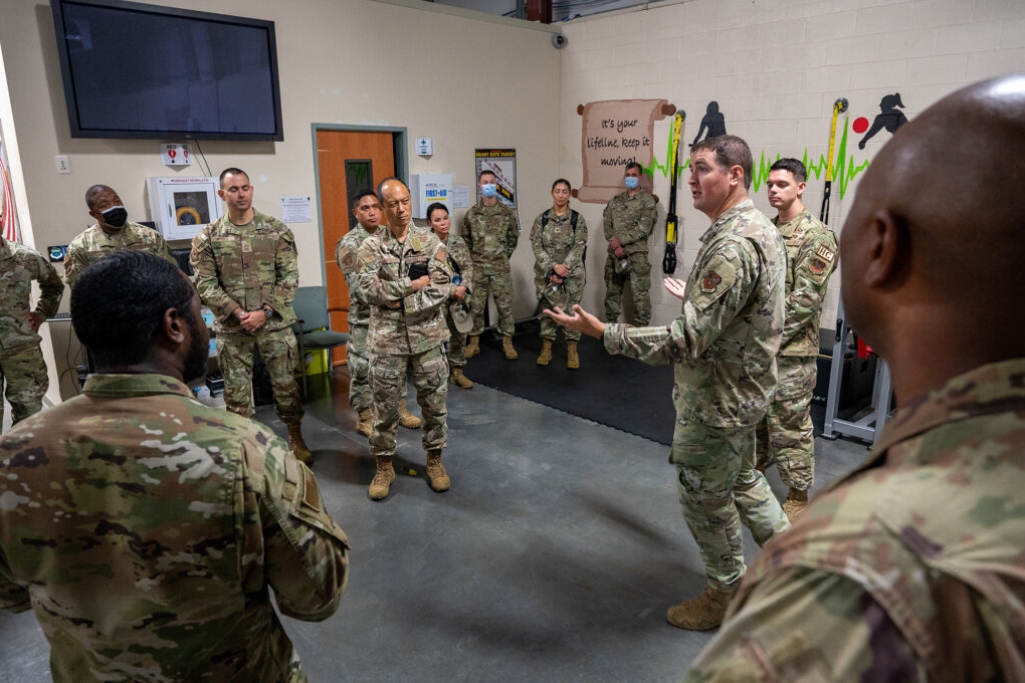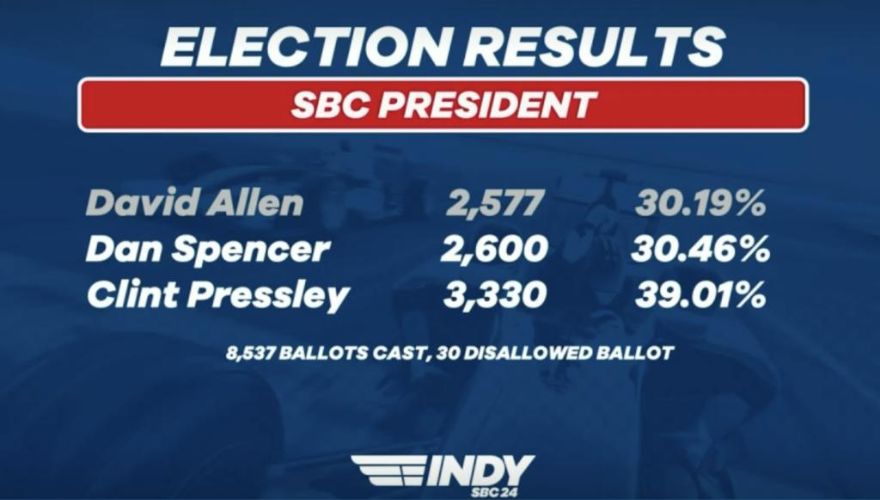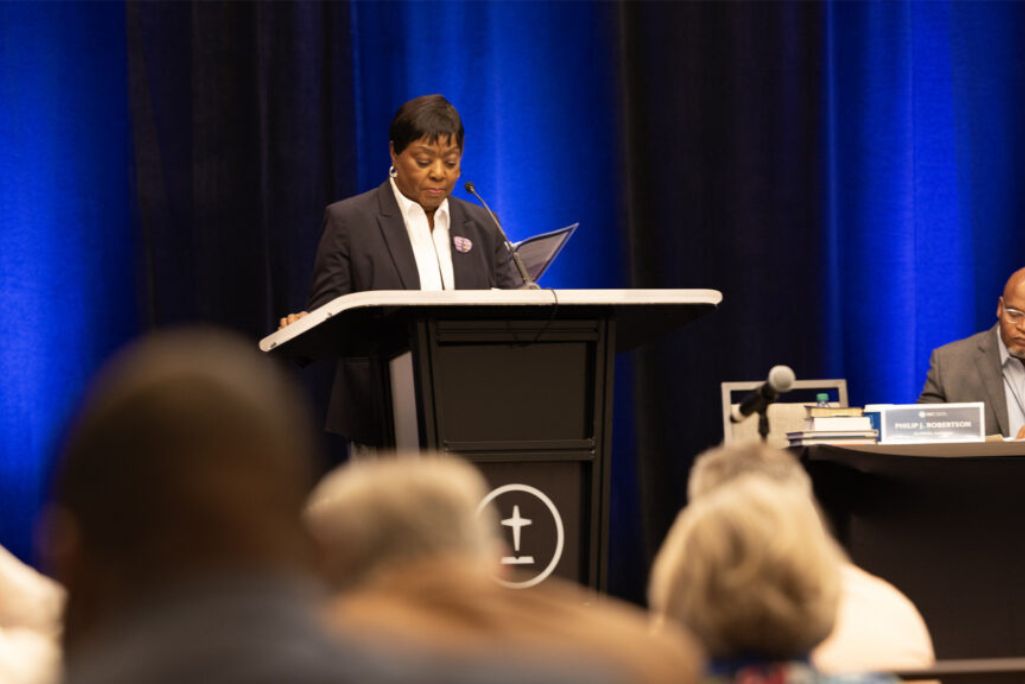
Maj. Matthew Knight, Air Force Mortuary Affairs Operations senior chaplain, shares information about the AFMAO resiliency program and family support team roles in caring for the mortuary team as well as families of the fallen with Col. Rudolph Cachuela, Air Mobility Command surgeon general, and members of the 436th Medical Group during the general's visit to Dover Air Force Base, Delaware, Sept. 20, 2022.
DOVER, Del. (BP) – Some days as an Air Force chaplain stand out among all others. For Matthew Knight, one of those days was August 29, 2021.
Three days earlier, 13 U.S. service members were killed during a suicide attack on the airport in Kabul, Afghanistan. On August 29, the remains of those soldiers arrived at Dover Air Force Base in Delaware, where President Joe Biden, Vice President Kamala Harris and other U.S. leaders paid tribute to those who had given their lives in service to the country.
As Knight took part in the solemn movement of the remains from the aircraft to an awaiting military vehicle, his attention fell on a young girl who was there to honor her uncle, one of the fallen.
“Seeing that little girl, who reminded me of my own daughter, and witnessing the brother’s grief, was profoundly moving,” said Knight, the senior chaplain for Air Force Mortuary Affairs Operations at Dover. “In that moment, I was grateful for the mask that hid my own tears. It’s in these moments that the weight of the situation becomes almost unbearable.”
Called a “dignified transfer,” the respectful process is carried out by the U.S. military to respectfully receive the remains of service members killed in a combat environment. Dover is the primary location for dignified transfers for the U.S. military and the location often captured on news broadcasts when remains of fallen U.S. service members return to the country.
“The dignified transfer is a solemn event that takes place upon the arrival of the aircraft at Dover Air Force Base,” Knight said. “Our honor guards or carry teams board the aircraft and retrieve the flag-draped transfer cases. They then carefully remove these transfer cases from the aircraft and place them in our transfer vehicle, which transports them to the Department of Defense mortuary here at Dover, the place where we carry out our duties.”
Knight, a North American Mission Board (NAMB) endorsed Southern Baptist chaplain, and his chaplaincy team have three primary responsibilities at Dover Air Force Base. They care for the families of fallen service members, provide care for the mortuary staff and train chaplains and mental health professionals in how to serve grieving families.
Helping families of the fallen is one of the most sacred responsibilities Southern Baptist chaplains take part in.
“Chaplains have the ministry training and pastoral experience to assist grieving families who frequently have so many questions after a death notification, ranging from the details about the death of their loved one, funeral home arrangements to local grief support resources,” said Doug Carver, the executive director of chaplaincy at NAMB.
Keith Croom, the chaplain pastoral care manager for the SBC at NAMB, is a retired Army chaplain who spent two years as the senior Army chaplain at Arlington National Cemetery. He describes the role of the chaplain in the death of the soldier as an opportunity to represent God and serve as his ambassador to the deceased family.
“At a memorial service or ceremony, chaplains have the opportunity to honor the dead or those fallen in combat while serving as an agent of hope to the living,” Croom said.
Knight grew up in Mississippi where he accepted Christ and was baptized at a Southern Baptist church in the state. After receiving an undergraduate degree from Liberty University, he pursued a Master of Divinity degree at Southwestern Baptist Theological Seminary in Fort Worth, Texas.
“I was on the path towards a pastoral ministry degree when the events of September 11 transpired, and I was still a student at the time,” Knight said. “This was a formative period for me and many of my generation, sparking the idea that I could serve my country in uniform. It was during this time that I met a military chaplain for the first time and discovered that it was possible to serve both my country and God simultaneously while in uniform. This realization was significant. Ultimately, I decided that this was precisely what I was meant to do. It felt like it was in my sweet spot, aligning perfectly with what I believe God had created me for.”
The process of caring for the remains of a service member and the spiritual needs of his or her family begins immediately after the death, as someone from that branch of the military begins to identify the person’s next of kin. A casualty team is then dispatched to the family to deliver the news and provide details about the death. Often this team includes two uniformed service members, such as a commander and a chaplain.
This team will put the family in contact with a casualty affairs representative, who will become the single point of contact for the family. That liaison will help coordinate the return of the body and help with funeral arrangements. At the same time, a liaison from Dover begins preparing for the body to arrive and for the dignified transfer process. The families will be given an opportunity to come to Dover to participate in the ceremony.
Knight asks Southern Baptists to continue to pray for chaplains who are serving throughout the world and providing spiritual support for grieving families.
“When I reflect on the support I’ve received from Southern Baptists, I’m overwhelmed with gratitude,” Knight said. “I was raised in Baptist churches and even attended a Southern Baptist seminary where they generously covered half of my tuition. The members of these Baptist churches continue to endorse us and generously contribute to the North American Mission Board through the Annie Armstrong Easter Offering. They consistently reach out to check on us, provide counsel and offer chaplain training events. I’m immensely thankful for the Southern Baptists who make this possible, in part through the Cooperative Program, as well as through their prayers and unwavering support.”
Knight also adds that Memorial Day is a great opportunity for Southern Baptists to remember members of the U.S. Armed Services who made the ultimate sacrifice for their country.
“Remembrance is so important,” Knight said. “That’s what we can do on Memorial Day. I would certainly encourage Baptists across the country and around the world to take those opportunities to remember why those folks have died, not necessarily for a political agenda, but for the cause of freedom.”


